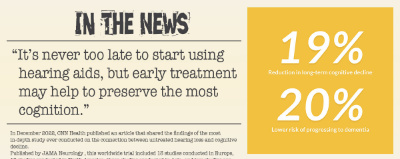“It is never too late to start using hearing aids, but early treatment may help to preserve the most cognition.”
In December 2022, CNN Health published an article that shared the findings of the most in-depth study ever conducted on the connection between untreated hearing loss and cognitive decline. Published by JAMA Neurology , this worldwide trial included 13 studies conducted in Europe, 12 studies conducted in North America, three studies conducted in Asia, and two studies conducted in Australasia.
It included a meta-analysis of 31 studies with 137,484 participants, both observational and trials. The research looked at the association between hearing loss and cognitive decline over a range of durations, from two to 25 years.
With the prevalence of SCD (subjective cognitive decline) among adults ages 65 years and older being 11.7%, we feel incredibly thankful that this in-depth and detailed study has finally been conducted at this scale.
What Were the Findings?
There were two significant findings:
- The study found that the use of hearing aids was associated with a 19% reduction in long-term cognitive decline.
- Even patients who had already started with mild cognitive impairment (early dementia) benefitted from the use of hearing aids, as they also had an approximately 20% lower risk of progressing to dementia.
The article states, “This means that it is never too late to start using hearing aids, but early treatment may help to preserve the most cognition.”
The report authors summarize the outcome of the report as follows: “In this meta-analysis, the usage of hearing aids and cochlear implants is associated with a decreased risk of subsequent cognitive decline; physicians should strongly encourage their patients with hearing loss to adopt such devices.”
This highly detailed study is the most conclusive and in-depth research carried out on the connection between cognitive decline and hearing aids/cochlear implants, and we’re thankful that it highlights the importance of prioritizing regular hearing assessments and treating hearing loss as early as possible.
The Vital Role of Regular Hearing Tests in Our Well-Being
This JAMA study highlights the importance of regular hearing tests in maintaining both our present and future well-being.
Taking care of our hearing health is crucial for fully participating in the world around us and preserving our cognitive function in the long run.
So if you haven’t had your hearing tested recently, now is the perfect time to schedule a comprehensive hearing assessment with one of our hearing care professionals. And if you know someone who could benefit from advanced hearing care, be sure to share this
information with them to encourage them to take action as well.
Let’s prioritize our hearing health and ensure that we can continue to hear and connect with the world for years to come.






